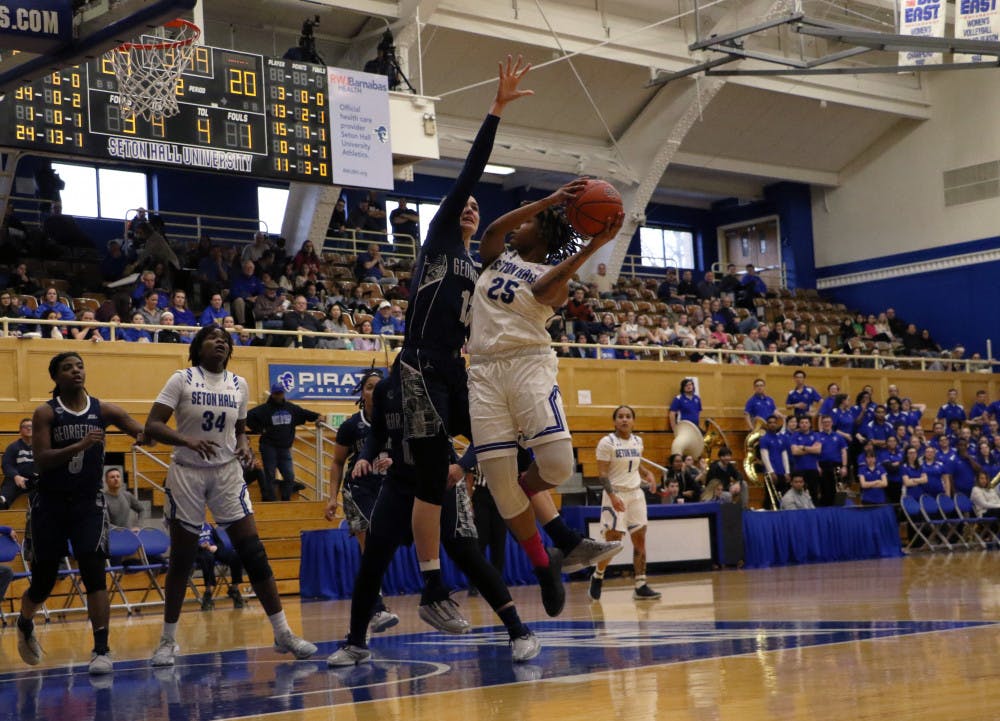Seton Hall is currently working to finalize a "Strategic Plan" for the university. The plan, which sets goals to improve Seton Hall by the year 2015 is titled "From Strength to Strength."
According to Dr. Gregory Burton, co-chair of Seton Hall's Strategic Plan Steering Committee and associate provost, the strategic plan was created to formulate and share a consensus of how the university community currently exists and what Seton Hall wishes to become in the future.
The latest draft of the strategic plan, available to students, is divided into six strategic directions, which are further broken down into 12 general goals. Each goal, according to Burton, is accompanied by a small number of concrete objectives.
"Some components of strategic plans reaffirm existing directions; others call for radical and substantial changes in strategy," Burton said. "The plan that is currently in progress at Seton Hall has many levels, some that articulate broad principles and some that attend to practical details about how our principles can be achieved."
The first of the six strategic directions is "A Home for the Mind, Body, and Spirit." The goals for this section of the strategic plan are to continue to celebrate the Catholic history of the university and to continue to fund, refine and create programs, such as the university core, which lead to the understanding of the university's Catholic heritage.
The second goal under the "Home for the Mind, Body and Heart," section of the strategic plan is to create an atmosphere in the university which would attract and retain students who are interested in the Catholic tradition.
The strategic plan then addresses academia, making it a goal for Seton Hall to become more distinguished in academics and scholarship. The two goals for this section, (titled "Distinction in Academics and Scholarship,") are to create a better atmosphere for academic excellence and to invest more in academic support areas, such as the library and technology.
Sophomore Renee Callender, an at-large senator for the Student Government Association, said that any improvement that could be made in the library would be welcome.
"The library and the programs that it offers are a huge student resource," Callender said.
Next, the strategic plan expresses the need to increase expectations for student success.
The creators of the strategic plan said, in order to succeed at making student success at Seton Hall more probable, the university must "identify, recruit and graduate academically prepared students."
The university can do this, the plan said, by increasing selectivity and determining the optimal number of graduate and undergraduate students.
"We definitely need to look for higher-caliber students," Callender said.
Sophomore Elizabeth Dudley, a diplomacy senator for the SGA, said that admissions shouldn't just look at a student's GPA or SAT score.
"We need to look at their curriculum instead and look for a rigorous, college prep program. Students who take these classes can do well because they had to succeed in the past," Dudley said.
Additionally, the plan said in order to increase student achievement, the university needs to "enhance and expand opportunities for student success," by doing things such as creating a center for academic excellence and possibly implementing more experiential learning opportunities.
The strategic plan also addresses a need for a larger focus on community.
In order to accomplish this, the strategic plan said Seton Hall must strengthen its Catholic and academic identity by recruiting and hiring individuals committed to the mission of Seton Hall and establish a community planning committee in order to implement the goals of the strategic plan.
In addition, Seton Hall needs to develop a culture of engagement and service, according to the strategic plan, in order to create a larger focus on the community.
The university can do this by investing in service opportunities and successful athletic teams in order to "encourage a vibrant fan base reflective of a competitive Division I program," the plan said.
The strategic plan then includes a section on increasing local and national engagement, which suggests that Seton Hall should figure out how the university is seen by outsiders, locally, nationally and internationally.
The university should then, according the plan, increase knowledge of Seton Hall by creating more alumni bases throughout the nation and more heavily recruit international students.
Dudley said while it would be a very good idea for the university to increase the amount of students that study abroad and international students that study here, it did not seem economically feasible.
"You would need to increase the staff in the office of international programs but that is not possible because of the budget," Dudley said.
Dudley added that, overall, the strategic plan seemed very general and hard to accomplish, given the university's current financial situation.
"They say we will 'selectively invest in' certain things," Dudley said. "Well, what does that mean?"
Finally, the strategic plan stated a need for "responsibility in stewardship." According to the plan, the university should commit to more transparent budgetary practices and adopt a practice of multi-year budgeting.
The plan said the university should diversify its sources of revenue by implementing a plan to significantly increase alumni donations to the university. Seton Hall, according to the plan, should also work on becoming more sustainable and create more concrete benchmarks for its sustainability efforts.
Burton and Dr. Mary Balkun, a professor in the English department, have been working on the strategic plan for two years.
The strategic plan steering committee also includes other faculty, a student member, a member of the Board of Regents and representatives from the student affairs, advancement and finance division, according to Burton.
The draft, first made available to students in October, should be finalized by the new president of Seton Hall, Burton said.
Caitlin Carroll can be reached at caitlin.carroll@student.shu.edu.





